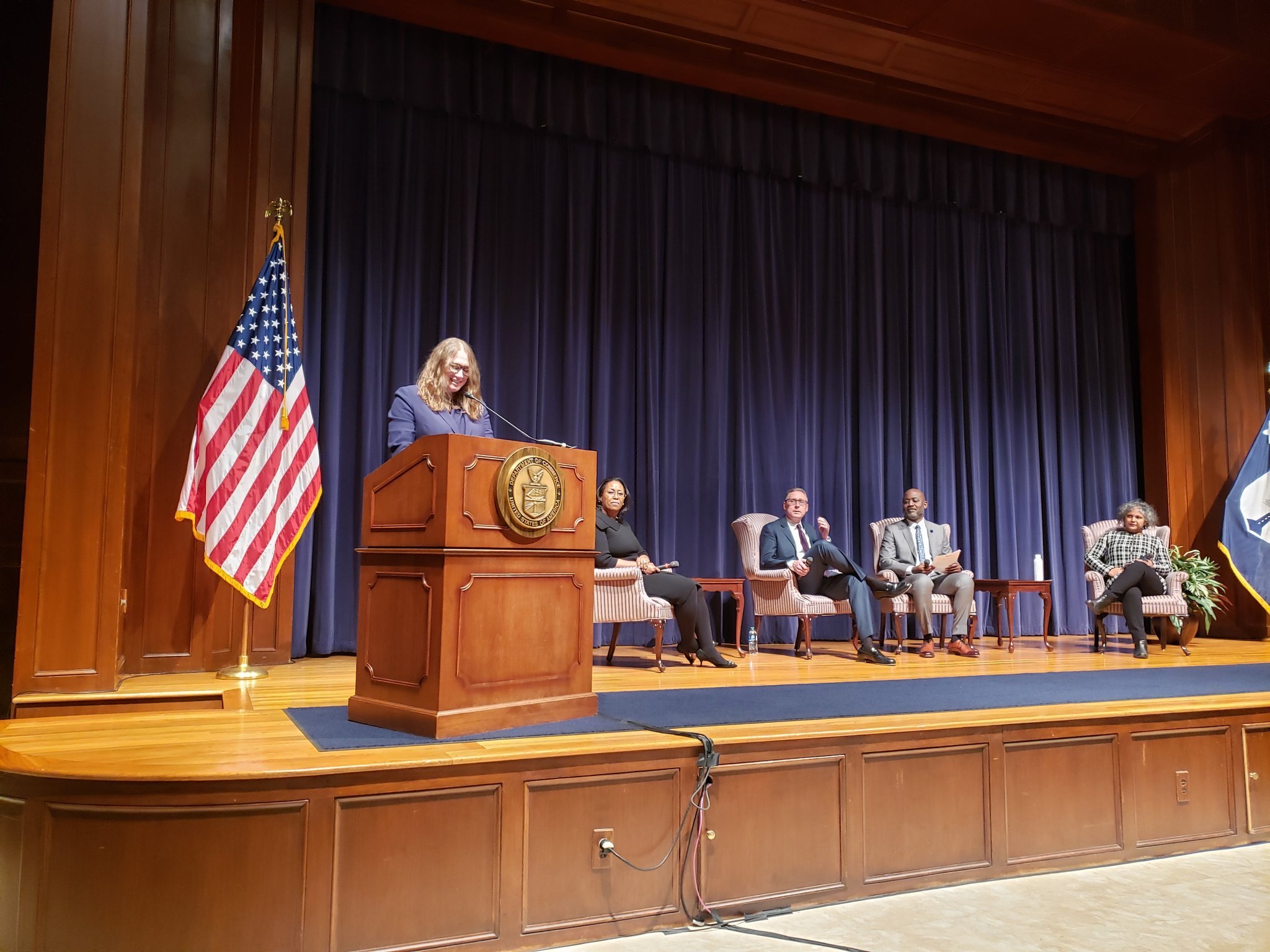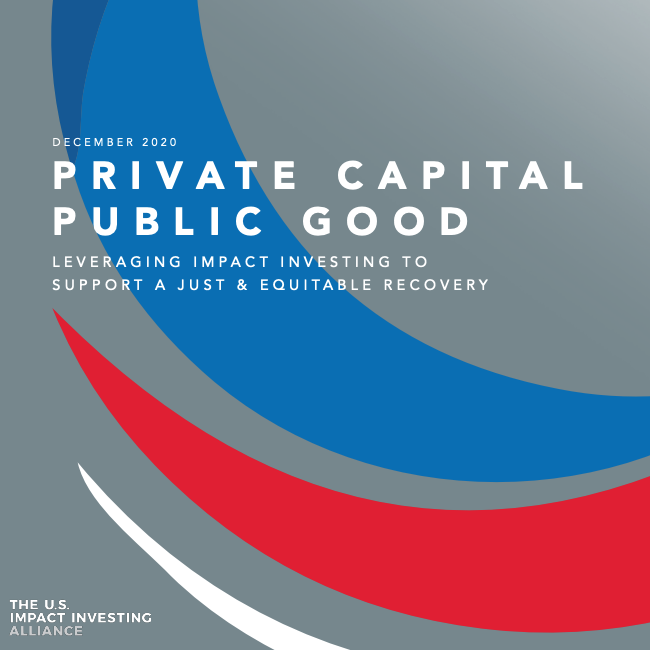The Year in Review: 2021 Highlights
President’s Letter: A Renewed Vision for Investing in an Equitable Economy for All
Dear Colleagues,
The past two years have been marked by extraordinary challenges. At the U.S. Impact Investing Alliance, we have striven to meet this moment with intentionality. We must also do so as a field, as impact investing has moved beyond a niche practice and increasingly reframes the way we think about traditional finance and our economy. These paired realities demand both reflection and action.
For the U.S. Impact Investing Alliance, they have inspired us to rethink our theory of change. Our founding mission from 2016 – to place measurable social, economic and environmental impact alongside risk and financial return at the core of every investment decision – is still relevant today. But changing realities coupled with the mainstreaming of impact and ESG investing inspired us to imagine a future that our collective efforts could help achieve.
Moving ahead, we hold a strong conviction that impact investors have a powerful role to play in manifesting a more equitable economy at the intersection of two broad movements: 1) transforming community investing and 2) accelerating the transition to stakeholder capitalism.
The first movement refers to the ways that, for decades, impact investors have leveraged their capital to support positive outcomes like affordable and safe housing, strong entrepreneurial ecosystems and healthy, resilient communities. Building on this history, we must now consider how to better empower community members, through authentic community engagement and cutting-edge practices, such as participatory investments.
The second movement calls for a reimagined economic system that is more inclusive and accountable to all. A shift away from extractive, short-term practices in the name of shareholder primacy is long overdue, and there is growing momentum for commonsense reforms that value the role of all stakeholders, including workers, communities and the physical environment.
What binds these two movements together is the need for transparency, accountability and an equitable distribution of power and resources across our economy. Structural changes to our economic system will result in corporations, investors, policymakers and others in positions of power taking all stakeholders, including communities, into account. At the same time, positive outcomes on the ground will enable these structural reforms to be durable and equitable in their reach.
For this reason, top-down systems change is necessary but entirely insufficient. To achieve an equitable economy, it must be paired with bottom-up, robust investments in community revitalization, driven by local priorities.
While we continue to explore what this new theory of change means for the work of the U.S. Impact Investing Alliance and the field writ large, we believe that impact investing is uniquely positioned to support these aims. I would like to thank our supporters for their continued partnership and inspiring leadership along the way.
Best,
Fran Seegull
Highlights from 2021
Launch of the Coalition on Inclusive Economic Growth
In late 2020, as the Alliance prepared its advocacy plans for the new administration, it became evident that the most effective path forward for advancing key priorities would be in coordination with like-minded allies across the field. As a result, the Alliance and B Lab organized a group of now nearly 60 impact-oriented business and investor organizations calling on the Biden-Harris Administration to establish a cross-agency, cross-sector Initiative on Inclusive Economic Growth.
In 2022, the Alliance looks forward to further engagement on the Coalition on Inclusive Economic Growth’s policy priorities.
First Annual Interagency Convening on Equitable Economic Growth
Fran Seegull, President of USIIA, speaking at Interagency Convening
On behalf of the Coalition, the Alliance and B Lab collaborated with the Department of Commerce on the Inaugural Interagency Convening on Equitable Economic Growth – the first-of-its-kind in the Biden-Harris Administration to focus on racial and economic equity. This convening gathered nearly 150 key private sector leaders, with thousands more tuning in virtually. Participants also included many senior administration officials, including Ambassador Susan Rice, Secretary of Commerce Gina Raimondo, Securities and Exchange Commission (SEC) Chair Gary Gensler, Small Business Administration (SBA) Administrator Isabella Guzman and the Deputy Secretaries of the Labor, Transportation and Treasury Departments. The Interagency Convening will be an annual event to promote progress and accountability from the government and the private sector on issues related to advancing economic, racial and gender equity.
Advancement of “Private Capital, Public Good” Policy Priorities
In December 2020, the Alliance published a public policy agenda that offered 12 recommendations to the incoming administration and Congress. Throughout 2021, the Alliance has continued to build on the priorities conveyed in the report, “Private Capital Public Good: Leveraging Impact Investing to Support a Just & Equitable Recovery,” to address the urgent and ongoing social, economic and environmental challenges facing the country.
Key industry wins in advancing the policy docket recommendations have included interagency alignment on Community Reinvestment Act reform, historic equity and equity-like investments in community development financial institutions, momentum for mandated corporate sustainability disclosure and progress around the future of fiduciary duty.
Partnership with the Federal Reserve Bank of New York - “Impact in Place”
In June 2021, the Alliance authored “Impact in Place: Emerging Sources of Community Investment Capital and Strategies to Direct it at Scale,” a report commissioned by the Federal Reserve Bank of New York. The report is meant to spark broader conversations around ways that public, private and philanthropic organizations can better invest in under-resourced communities and uplift them as essential stakeholders and partners.
The report and five accompanying case studies explore the current community investing landscape, related to how different sources of capital are supporting the small business ecosystem, diverse entrepreneurs, affordable housing, community wealth building and more. It also examines emerging sources of community investment capital, such as corporate treasury commitments to economic development, the role of high-net-worth individuals, donor-advised funds and innovative, participatory models that center community members directly within the decision-making process.
Movement Building and Communications
In 2021, the Alliance launched the Policy Corner in partnership with ImpactAlpha – the leading digital publication in the impact investing space – to promote the central role that public policy can play in advancing and impacting the field. Through the Policy Corner, the Alliance authors policy updates and opinion pieces and invites its partners – including the Urban Institute, GSG, Public Citizen and others – to publish their unique viewpoints as well.
The Alliance also regularly engages in speaking events, interviews and conferences to build and refine the narrative of the impact investing community - with topics including public policy, the state of the field, community investing practices and more. Throughout 2021, Alliance staff spoke at over 30 events, including SOCAP21 Virtual, Sorenson’s Innovation Summit and Future Nexus’s U.S. Public Investment Institution Webinar.
Click here to access the PDF version of our 2021 Highlights.






